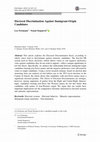Books by Nenad Stojanović
Papers by Nenad Stojanović

Comparative Political Studies, 2021
An influential explanation for the persistent political underrepresentation of minorities in elec... more An influential explanation for the persistent political underrepresentation of minorities in elected office is that minority candidates are discriminated against by voters of the dominant ethnic group. We argue, however, for the need to distinguish between two forms of discrimination: ingroup favoritism and outgroup hostility. We measure the impact of each by using an extensive data set drawn from Swiss elections, where voters can cast both positive and negative preference votes for candidates. Our results show that immigrantorigin candidates with non-Swiss names incur an electoral disadvantage because they receive more negative preference votes than candidates with typically Swiss names. But we also find that minority candidates face a second disadvantage: voters discriminate in favor of majority candidates by allocating them more positive preference votes. These two forms of electoral discrimination are critically related to a candidate's party, whereas the impact of the specific outgroup to which a minority candidate belongs is less pronounced than expected.
Journal of Common Market Studies, 2020
The EU has long been suffering a legitimacy crisis. In this article we argue that multilingual Eu... more The EU has long been suffering a legitimacy crisis. In this article we argue that multilingual Europarties, that is, European political parties operating in all the various languages spoken by their members via interpreting and translation, rather than resorting to a lingua franca, could contribute to providing an effective democratic linkage between EU citizens and EU institutions. Moreover, by drawing inspiration from an analysis of Belgium, Canada and Switzerland, we argue that centripetal institutions such as an EU-wide electoral district, presidentialism, and direct democracy could provide favourable institutional conditions for the development of such multilingual Europarties.

Political Behavior, 2019
This article explores the Electoral Discrimination thesis, according to which voters tend to disc... more This article explores the Electoral Discrimination thesis, according to which voters tend to discriminate against minority candidates. The free-list PR system used in Swiss elections-which allows voters to cast negative preference votes against candidates they do not want to support-offers a unique opportunity to test this thesis. Specifically, we analyze the relationship between immigrant-origin candidates bearing non-Swiss names and the negative preference votes allocated by voters to single candidates. Using a novel research strategy, based on election data stemming from our analysis of real ballots cast in the 2014 local elections in the Canton of Zurich, the article shows that candidates with non-Swiss names incur a significant electoral penalty. The effects of Electoral Discrimination are stronger, however, among supporters of parties from the Right and Center-Right. Interestingly , candidates bearing non-Swiss but Western names do not fare better than candidates with names of non-Western origin. We argue that our results have important implications for the comparative literature interested in electoral systems and minority representation.

Critical Review of International Social and Political Philosophy, 2017
In Equal Recognition, Alan Patten argues that in a proper relationship between normative politica... more In Equal Recognition, Alan Patten argues that in a proper relationship between normative political theory and democratic politics, we must make a clear distinction between two questions related to cultural rights: (a) authority (who should decide?) and (b) the substance of deliberation. The question he wants to explore, however, is not the authority question but the substantive question. The aim of this article is to show that an account of equal recognition cannot bracket out the democratic element. It argues, first, that Equal Recognition does not live up to its initial promise, as it contains a number of reflections and recommendations (on language rights, on secession, on the rights of migrants' cultures) that either explicitly or implicitly include the democratic element. Second, it points at other important areas of political decision-making-such as electoral system design, districting, referendums, quotas-in which it is quite clear that in order to extend equal recognition to minority cultures, we are obliged to take decisions related to the design of democratic institutions.
The Routledge Handbook of the Ethics of Discrimination, 2018

Zeitschrift für Vergleichende Politikwissenschaft, 2018
Polities that follow the consociational model of democracy adopt power-sharing provisions, guaran... more Polities that follow the consociational model of democracy adopt power-sharing provisions, guaranteeing a certain number of seats to representatives of their societies' main ethnic groups. Yet in all hardcore ("corporate") consociational systems - Belgium, Bosnia and Herzegovina, Burundi, Lebanon, Northern Ireland, and South Tyrol - we also find "Others": citizens who do not belong to any of the main ethnic segments. These Others are typically subjected to patterns of political marginalisation and exclusion that are problematic for a liberal democracy. In some cases, such patterns have been deemed discriminatory by courts, most notably in several rulings of the European Court of Human Rights concerning the position of Others in Bosnia and Herzegovina. This article provides a conceptual framework for identifying Others in consociational systems and presents the first comprehensive overview of the legal and political status of Others in the six corporate consociations.

International Political Science Review, 2020
This article questions the notion of 'consociational democracy'. It argues that it rests on shaky... more This article questions the notion of 'consociational democracy'. It argues that it rests on shaky ground, empirically and conceptually. As an empirical matter, a consociation is inherently unstable because it tends either to collapse into ethnoicracy (where the power is shared by the main ethnic groups so that citizens who do not belong to them are politically marginalized) or to become a non-consociational, liberal democracy. At the conceptual level 'consociational democracy' is an impossibility because a polity cannot be both consociational and democratic. This article argues that consociations can be at best demoicracies-that is, polities composed not of a single demos but of multiple demoi. Yet the problem of stability remains. The article concludes with the suggestion that the stability problem can be addressed by adopting a weak form of demoicracy-the 'demoi-within-demos' constellation-where a thin demos coexists with multiple demoi.
Politique et Sociétés, 2000
Société québécoise de science politique ISSN 1203-9438 (imprimé) 1703-8480 (numérique) Découvrir ... more Société québécoise de science politique ISSN 1203-9438 (imprimé) 1703-8480 (numérique) Découvrir la revue Citer cet article Stojanovic, N. (2010). Une conception dynamique du principe de territorialité linguistique : La loi sur les langues du canton des Grisons.
Swiss Political Science Review, 2011

In 1990, according to polls, 7 out of 10 citizens of Bosnia and Herzegovina were against ethnic p... more In 1990, according to polls, 7 out of 10 citizens of Bosnia and Herzegovina were against ethnic parties. Yet, 75% of voters ended up voting for one of the three main ethno-nationalist parties. In no other post-communist country, including other former Yugoslav republics, did ethnic parties receive such large support in the first democratic elections. In Croatia, for example, in the 1990 elections the Croatian ethnic party Hrvatska demokratska zajednica gathered 42% and the Serb ethnic party Srpska demokratska stranka gathered only 2% of the vote. Were Bosnians and Herzegovinians already that much ethno-nationalistically oriented in 1990? The article rejects this thesis and purports to explain the voting behaviour of the Bosnian electorate by using the prisoner's dilemma theoretical framework. It concludes by arguing that the problem of collective action could have been addressed via a pre-electoral referendum on a ban of ethnic parties – a ban which had been actually adopted by the then-ruling Communist party, but was eventually overturned by the Constitutional Court of Bosnia and Herzegovina.
The elections to the Swiss Federal Council in December 2015 re-established a system of party-cent... more The elections to the Swiss Federal Council in December 2015 re-established a system of party-centred concordance, cherished in consociational theory, consisting of two representatives of the Swiss People's Party, two Radicals, two Social Democrats and one Christian Democrat. At the same time, the government has rarely been as unbalanced in terms of the representation of Switzerland's languages and regions. The article analyses the concept of concordance with regard to both aspects of governmental inclusiveness. It also highlights the crucial role of electoral rules used in governmental elections. It argues that they resemble the Alternative Vote, a majoritarian electoral system that has been criticized in consociational theory but prescribed by the rival, centripetalist approach to power sharing.

In Equal Recognition, Alan Patten argues that in a proper relationship between normative politica... more In Equal Recognition, Alan Patten argues that in a proper relationship between normative political theory and democratic politics, we must make a clear distinction between two questions related to cultural rights: (a) authority (who should decide?) and (b) the substance of deliberation. The question he wants to explore, however, is not the authority question but the substantive question. The aim of this article is to show that an account of equal recognition cannot bracket out the democratic element. It argues, first, that Equal Recognition does not live up to its initial promise, as it contains a number of reflections and recommendations (on language rights, on secession, on the rights of migrants' cultures) that either explicitly or implicitly include the democratic element. Second, it points at other important areas of political decision-making – such as electoral system design, districting, referendums, quotas – in which it is quite clear that in order to extend equal recognition to minority cultures, we are obliged to take decisions related to the design of democratic institutions.
Political Studies Review, 2013
Representation, 2008
Formal rules for group representation like constitutional quotas or reserved seats are among the ... more Formal rules for group representation like constitutional quotas or reserved seats are among the most widespread mechanisms of power sharing in culturally heterogeneous countries. Critics, however, consider these tools as counterproductive for the establishment of peace ...
Nations and Nationalism, 2011
Swiss Political Science Review, 2006
... Counterevidence from Switzerland Nenad STOJANOVIC University of Zurich Abstract ... Page 2. 1... more ... Counterevidence from Switzerland Nenad STOJANOVIC University of Zurich Abstract ... Page 2. 132 NENAD STOJANOVIC ´ Lijphart (2004: 99f.) further claims that there is a scholarly consensus against majoritarian (or plurality) systems in divided societies. ...









Uploads
Books by Nenad Stojanović
Papers by Nenad Stojanović